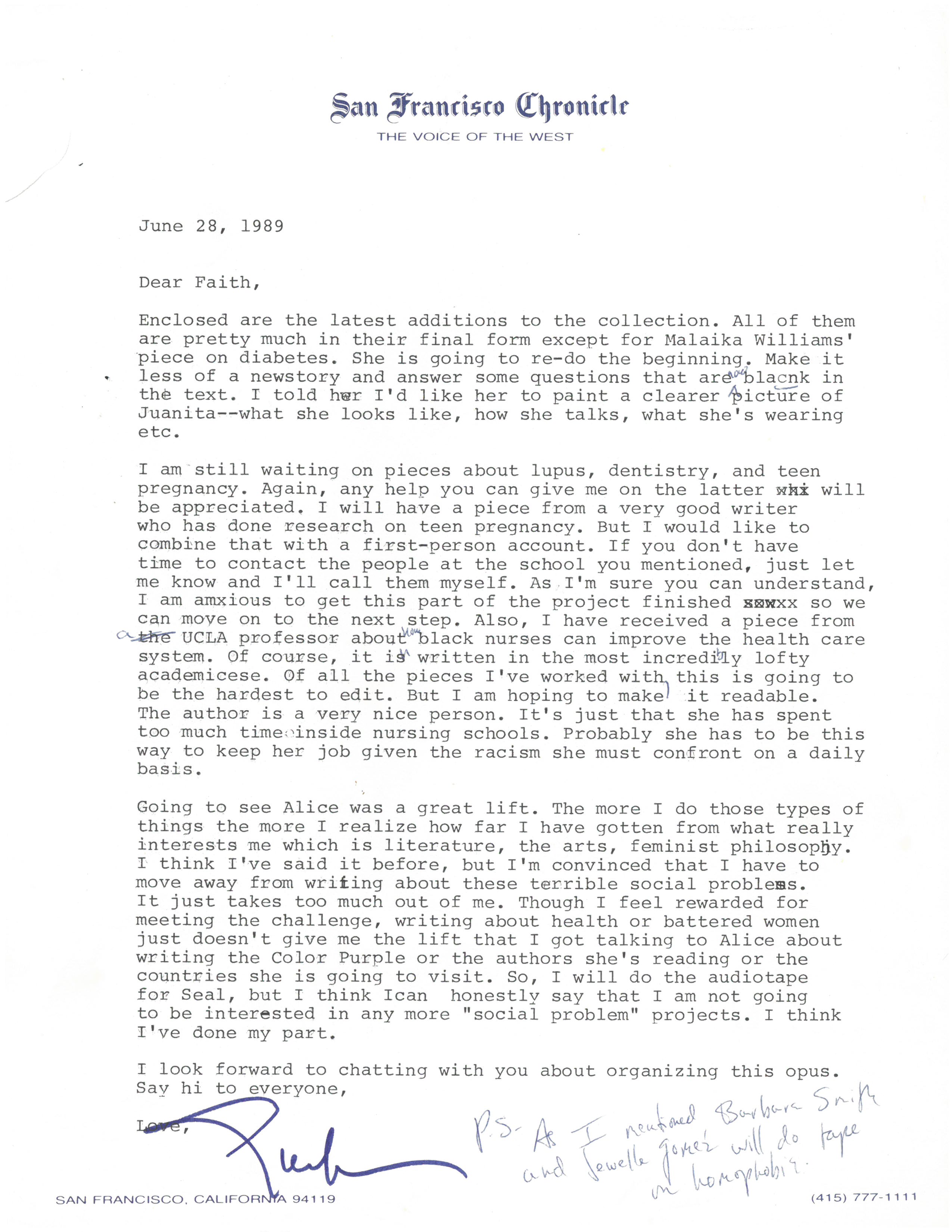
|
Transcription: [Letterhead: San Francisco Chronicle The Voice of the West] June 28, 1989 Dear Faith, Enclosed are the latest additions to the collection. All of them are pretty much in their final form except for Malaika Williams’[1] piece on diabetes.[2] She is going to re-do the beginning. Make it less of a newstory [sic] and answer some questions that are <^now> blacnk [blank] in the text. I told her I’d like her to paint a clearer picture of Juanita[3]–what she looks like, how she talks, what she’s wearing etc. I am still waiting on pieces about lupus, dentistry, and teen pregnancy.[4] Again, any help you can give me on the latter whi will be appreciated. I will have a piece from a very good writer who has done research on teen pregnancy. But I would like to combine that with a first-person account. If you don’t have time to contact the people at the school you mentioned, just let me know and I’ll call them myself. As I’m sure you can understand, I am amxious [sic] to get this part of the [project finished sow so we can move on to the next step. Also, I have received a piece from the <a> UCLA professor about <how> black nurses can improve the health care system.[5] Of course, it is written in the most incredi<b>ly lofty academicese [sic]. Of all the pieces I’ve worked with<,> this is going to be the hardest to edit. But I am hoping to make it readable. The author is a very nice person. It’s just that she has spent too much time inside nursing schools. Probably she has to be this way to keep her job given the racism she must confront on a daily basis. Going to see Alice[6] was a great lift. The more I do those types of things the more I realize how far I have gotten from what really interests me which is literature, the arts, feminist philosophy. I think I’ve said it before, but I’m convinced that I have to move away from writing about these terrible social problems. It just takes too much out of me. Though I feel rewarded for meeting the challenge, writing about health or battered women[7] just doesn’t give me the lift that I got talking to Alice about writing the Color Purple or the authors she’s reading or the countries she is going to visit. So, I will do the audiotape[8] for Seal, but I think I can honestly say that I am not going to be interested in any more “social problem” projects. I think I’ve done my part. I look forward to chatting with you about organizing this opus. Say hi to everyone, Love, [Signed: Evelyn] <P. S- As I mentioned Barbara Smith and Jewelle Gomez will do tape on homophobia.>[9] Transcribed by Natalia Shevin |
[1] Malaika Williams was a commercial officer in the U. S. Embassy in Madagascar.
[2] Published in The Black Women’s Health Book as “The Best Foot Forward: A Black Woman Deals with Diabetes.”
[3] Juanita Bryant, a diabetic Black woman whose story Williams uses to narrate larger trends of issues with diabetes.
[4] Pieces that would become the essays: “Lupus and Black Women: Managing a Complex Chronic Disability,” by Vida Labrie Jones, “One Determination: A Black Female Dentist Speaks,” by Denise Alexander, and “Teenage Pregnancy: A Case for National Action,” by Faye Wattleton.
[5] Likely Melissa Blount’s “Surpassing Obstacles: Pioneering Black Women Physicians,” as it is the only essay concerning the healthcare field not written as a personal account.
[6] Alice Walker, author and activist most famous for The Color Purple (1982).
[7] Referencing White’s earlier non-fiction work, Chain Chain Change: For Black Women in Abusive Relationships.
[8] Likely referring to recording Chain Chain Change for Seal Press’ multi-year audiotape series. In 1991, Seal Press released Chain Chain Change, Mejor Sola, and Getting Free 3.
[9] Jewelle L. Gomez and Barbara Smith wrote “Taking the Home Out of Homophobia: Black Lesbian Health” for the anthology.